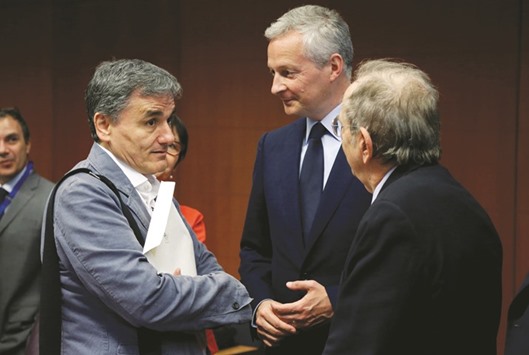Eurozone finance ministers may agree to release new loans to Greece but are likely to struggle to convince the International Monetary Fund to join the bailout by keeping the prospect of debt relief for Athens highly conditional.
Greece needs new cash from the eurozone to avoid a default in July when it has to repay some €7.3bn worth of maturing loans.
To get the money, the Greek parliament approved pension cuts and tax hikes last Thursday.
Eurozone officials said a report prepared for the ministers’ meeting on whether Greece has implemented “prior actions” – laws that have to be passed to make the reforms stick – was positive, paving the way for disbursement.
Asked when eurozone ministers could release the next tranche of loans to Greece, the chairman of the ministers Jeroen Dijsselbloem told reporters: “If all goes well, today.”
But the main purpose of the talks – to get the IMF to join the bailout – may be tough to achieve because the IMF wants the eurozone to commit now, more firmly and in greater detail to debt relief for Athens, even if it were to happen only in 2018.
This is difficult to swallow for Germany, which faces elections in September, and several other countries, which all want to retain some leverage over the Greek government to make sure it delivers on all the promised reforms until 2018.
“We have to see how we can find a solution with the IMF, so that the IMF can be part of the programme without breaching its rules.
That will be one of the difficult issues,” German Finance Minister Wolfgang Schaeuble said.
Belgian finance minister Johan Van Overtveldt cautioned against debt relief promises and noted Greece was already getting cheaper financing than even his own country thanks to the ultra-low borrowing costs of the eurozone bailout fund ESM.
“When you look at interest rate burden... for Greece in terms of GDP it is already by far the lowest within the euro area,” he said on entering the talks.
Slovak finance minister Peter Kazimir also said Greece did not need debt relief now.
Dijsselbloem made clear a formal decision on whether to grant Greece more debt relief would only be taken once the bailout ends in mid-2018, repeating a Eurogroup statement from May 2016, which also spelt out what relief could be considered.
“The IMF has asked for more clarity... on how far that could go and what that could look like, so that’s what we will look at today,” Dijsselbloem said.
“Could we give more specifics on what the debt measures could be? But, again, the formal decision on debt relief, if needed, will come at the end of the programme,” he said.
A group of mainly northern-European eurozone countries want the IMF to join the bailout for credibility reasons, believing the European Commission’s approach can be too lenient.
But the same countries oppose a firm pledge of debt relief for Greece, fearing the disapproval of bailout-weary voters at home and lack of incentive for Greece to continue reforms.
The discussion yesterday will therefore focus on how to make a eurozone statement on Greek debt relief from a year ago more detailed and more concrete without promising too much.
Germany does not want to go beyond a promise made by the Eurogroup in May 2016 to extend the maturities and grace periods on Greek loans so that Greece’s gross financing needs are below 15% of GDP after 2018 for the medium term, and below 20% of GDP later.
The Eurogroup also said at the time it would consider replacing more costly IMF loans to Greece with cheaper euro zone credit and transfer the profits made from a portfolio of Greek bonds bought by eurozone national central banks back to Athens.
But all that could happen only if Greece delivered on its reforms by mid-2018 and only if an analysis showed Athens needed the debt relief to make its debt sustainable.
The IMF believes that debt relief, or at least a clear promise of it now, is clearly needed and is important to restore investor confidence in Greece, especially if the country, which has public debt of almost twice the size of its GDP, is to return to market financing.
But Germany and its allies believe that if Greece were to keep its primary surplus high enough for long enough and with the current cheap loans from the ESM, debt relief would be unnecessary.

From left: Greek Finance Minister Euclid Tsakalotos, French Economy Minister Bruno Le Maire and Italy’s Finance Minister Pier Carlo Padoan attend a eurozone finance ministers meeting in Brussels yesterday. Greece needs new cash from the eurozone to avoid a default in July when it has to repay some u20ac7.3bn worth of maturing loans.
